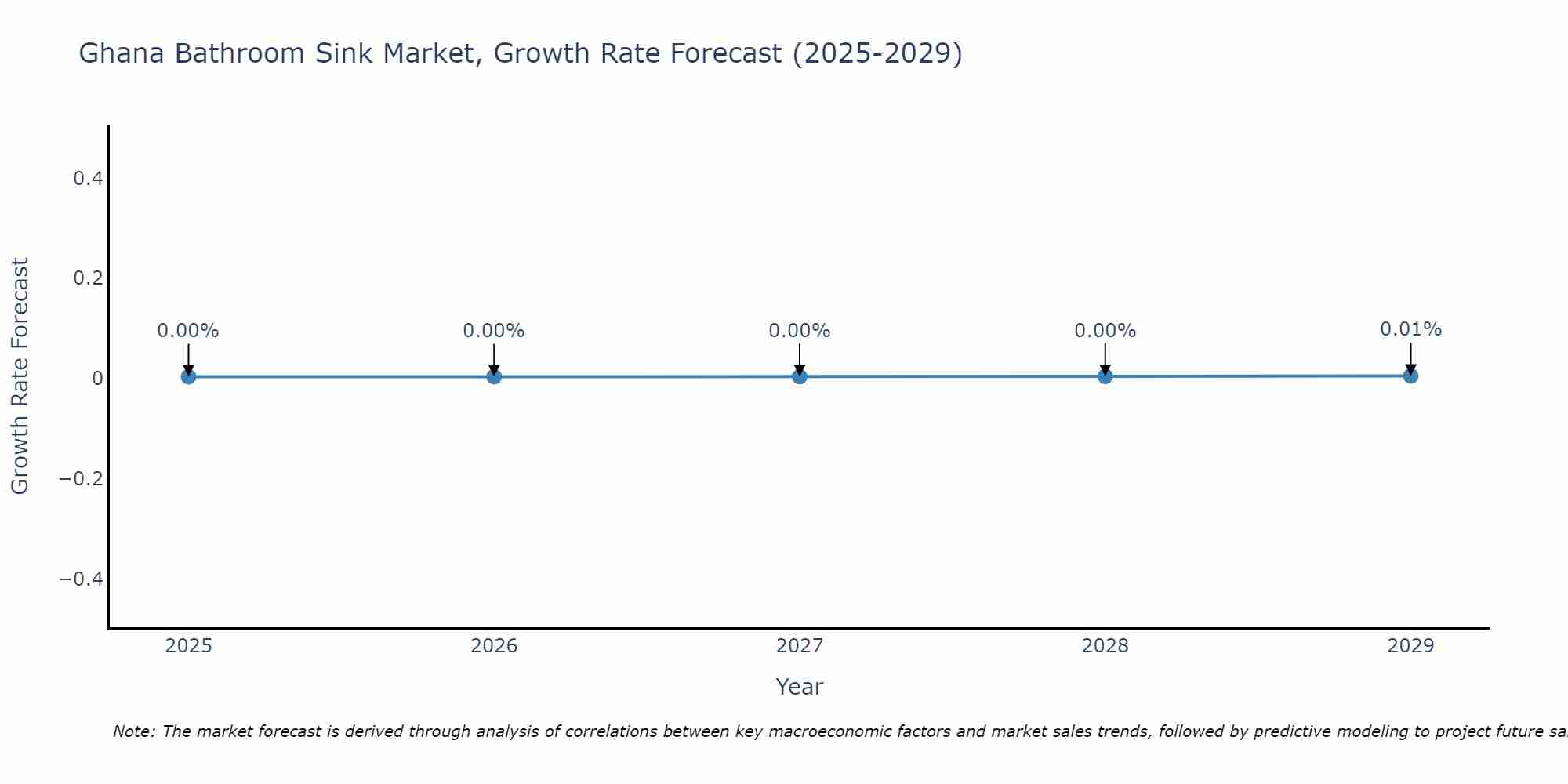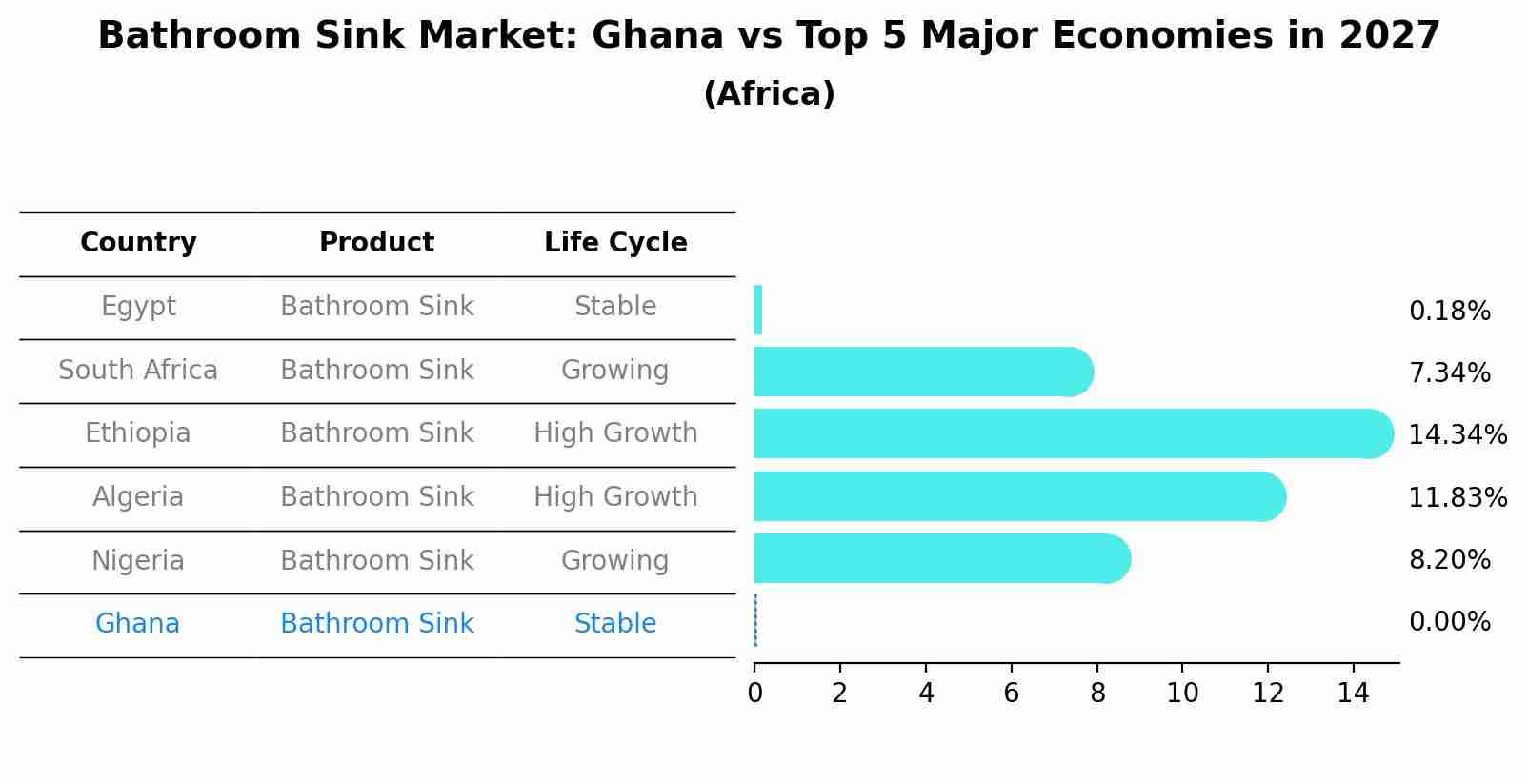Ghana Bathroom Sink Market (2025-2031) Outlook | Trends, Share, Value, Companies, Forecast, Analysis, Revenue, Size, Industry, Growth
| Product Code: ETC375116 | Publication Date: Aug 2022 | Updated Date: Apr 2025 | Product Type: Market Research Report | |
| Publisher: 6Wresearch | Author: Shubham Padhi | No. of Pages: 75 | No. of Figures: 35 | No. of Tables: 20 |
Ghana Bathroom Sink Market Size Growth Rate
The Ghana Bathroom Sink Market is poised for steady growth rate improvements from 2025 to 2029. The growth rate starts at 0.00% in 2025 and reaches 0.01% by 2029.

Bathroom Sink Market: Ghana vs Top 5 Major Economies in 2027 (Africa)
By 2027, Ghana's Bathroom Sink market is forecasted to achieve a stable growth rate of 0.00%, with Egypt leading the Africa region, followed by South Africa, Ethiopia, Algeria and Nigeria.

Ghana Bathroom Sink Market Overview
The Ghana Bathroom Sink Market is experiencing growth propelled by factors such as real estate development, housing construction, and interior design trends. Bathroom sinks, including pedestal sinks, vanity sinks, and vessel sinks, serve as functional and decorative fixtures in residential and commercial bathrooms, contributing to their demand in Ghana construction and renovation markets.
Drivers of the market
The bathroom sink market in Ghana is driven by the construction and renovation activities in residential, commercial, and hospitality sectors. Bathroom sinks come in various styles, sizes, and materials such as porcelain, stainless steel, and glass, offering functionality, durability, and aesthetic appeal in bathroom design and decor.
Challenges of the market
In Ghana, the bathroom sink market faces challenges such as competition from alternative materials, design preferences, and supply chain disruptions. Bathroom sinks, essential fixtures in residential and commercial bathrooms, are available in various materials such as porcelain, ceramic, stainless steel, and natural stone. However, competition from alternative materials such as solid surface countertops, glass, and concrete may impact market demand for traditional ceramic and porcelain sinks. Moreover, evolving design trends and consumer preferences for minimalist, space-saving, and customizable bathroom fixtures may influence purchasing decisions. Additionally, managing supply chain disruptions, including raw material shortages, transportation delays, and import/export restrictions, can pose challenges for sink manufacturers and distributors. Addressing these challenges through product innovation, market segmentation, and supply chain optimization is essential to maintain market competitiveness and meet the diverse needs of consumers in the bathroom sink segment in Ghana.
Government Policy of the market
Government policies in the bathroom sink market may focus on promoting water conservation, sanitation, and hygiene through regulations and standards for sink design, construction, and installation. Initiatives might include water efficiency standards for bathroom fixtures to reduce water consumption and promote sustainable water use, building codes and regulations for sink installation and plumbing to ensure proper sanitation and wastewater management, and public education campaigns to raise awareness about the importance of water-saving practices and hygiene in households and public facilities.
Key Highlights of the Report:
- Ghana Bathroom Sink Market Outlook
- Market Size of Ghana Bathroom Sink Market, 2024
- Forecast of Ghana Bathroom Sink Market, 2031
- Historical Data and Forecast of Ghana Bathroom Sink Revenues & Volume for the Period 2021-2031
- Ghana Bathroom Sink Market Trend Evolution
- Ghana Bathroom Sink Market Drivers and Challenges
- Ghana Bathroom Sink Price Trends
- Ghana Bathroom Sink Porter's Five Forces
- Ghana Bathroom Sink Industry Life Cycle
- Historical Data and Forecast of Ghana Bathroom Sink Market Revenues & Volume By Product for the Period 2021-2031
- Historical Data and Forecast of Ghana Bathroom Sink Market Revenues & Volume By Under-mount Sinks for the Period 2021-2031
- Historical Data and Forecast of Ghana Bathroom Sink Market Revenues & Volume By Top-mount Sinks for the Period 2021-2031
- Historical Data and Forecast of Ghana Bathroom Sink Market Revenues & Volume By Pedestal Sinks for the Period 2021-2031
- Historical Data and Forecast of Ghana Bathroom Sink Market Revenues & Volume By Vessel Sinks for the Period 2021-2031
- Historical Data and Forecast of Ghana Bathroom Sink Market Revenues & Volume By Integrated Sink and Countertops for the Period 2021-2031
- Historical Data and Forecast of Ghana Bathroom Sink Market Revenues & Volume By Semi recessed Sinks for the Period 2021-2031
- Historical Data and Forecast of Ghana Bathroom Sink Market Revenues & Volume By Wall-mounted Sinks for the Period 2021-2031
- Historical Data and Forecast of Ghana Under-mount Sinks Bathroom Sink Market Revenues & Volume By Washplane Sinks for the Period 2021-2031
- Historical Data and Forecast of Ghana Bathroom Sink Market Revenues & Volume By Application for the Period 2021-2031
- Historical Data and Forecast of Ghana Bathroom Sink Market Revenues & Volume By Residential for the Period 2021-2031
- Historical Data and Forecast of Ghana Bathroom Sink Market Revenues & Volume By Non-residential for the Period 2021-2031
- Ghana Bathroom Sink Import Export Trade Statistics
- Market Opportunity Assessment By Product
- Market Opportunity Assessment By Application
- Ghana Bathroom Sink Top Companies Market Share
- Ghana Bathroom Sink Competitive Benchmarking By Technical and Operational Parameters
- Ghana Bathroom Sink Company Profiles
- Ghana Bathroom Sink Key Strategic Recommendations
Frequently Asked Questions About the Market Study (FAQs):
- Single User License$ 1,995
- Department License$ 2,400
- Site License$ 3,120
- Global License$ 3,795
Search
Thought Leadership and Analyst Meet
Our Clients
Related Reports
- Afghanistan Apparel Market (2026-2032) | Growth, Outlook, Industry, Segmentation, Forecast, Size, Companies, Trends, Value, Share, Analysis & Revenue
- Canada Oil and Gas Market (2026-2032) | Share, Segmentation, Value, Industry, Trends, Forecast, Analysis, Size & Revenue, Growth, Competitive Landscape, Outlook, Companies
- Germany Breakfast Food Market (2026-2032) | Industry, Share, Growth, Size, Companies, Value, Analysis, Revenue, Trends, Forecast & Outlook
- Australia Briquette Market (2025-2031) | Growth, Size, Revenue, Forecast, Analysis, Trends, Value, Share, Industry & Companies
- Vietnam System Integrator Market (2025-2031) | Size, Companies, Analysis, Industry, Value, Forecast, Growth, Trends, Revenue & Share
- ASEAN and Thailand Brain Health Supplements Market (2025-2031) | Strategy, Consumer Insights, Analysis, Investment Trends, Opportunities, Growth, Size, Share, Industry, Revenue, Segments, Value, Segmentation, Supply, Forecast, Restraints, Outlook, Competition, Drivers, Trends, Demand, Pricing Analysis, Competitive, Strategic Insights, Companies, Challenges
- ASEAN Bearings Market (2025-2031) | Strategy, Consumer Insights, Analysis, Investment Trends, Opportunities, Growth, Size, Share, Industry, Revenue, Segments, Value, Segmentation, Supply, Forecast, Restraints, Outlook, Competition, Drivers, Trends, Demand, Pricing Analysis, Competitive, Strategic Insights, Companies, Challenges
- Europe Flooring Market (2025-2031) | Outlook, Share, Industry, Trends, Forecast, Companies, Revenue, Size, Analysis, Growth & Value
- Saudi Arabia Manlift Market (2025-2031) | Outlook, Size, Growth, Trends, Companies, Industry, Revenue, Value, Share, Forecast & Analysis
- Uganda Excavator, Crane, and Wheel Loaders Market (2025-2031) | Strategy, Consumer Insights, Analysis, Investment Trends, Opportunities, Growth, Size, Share, Industry, Revenue, Segments, Value, Segmentation, Supply, Forecast, Restraints, Outlook, Competition, Drivers, Trends, Demand, Pricing Analysis, Competitive, Strategic Insights, Companies, Challenges
Industry Events and Analyst Meet
Whitepaper
- Middle East & Africa Commercial Security Market Click here to view more.
- Middle East & Africa Fire Safety Systems & Equipment Market Click here to view more.
- GCC Drone Market Click here to view more.
- Middle East Lighting Fixture Market Click here to view more.
- GCC Physical & Perimeter Security Market Click here to view more.
6WResearch In News
- Doha a strategic location for EV manufacturing hub: IPA Qatar
- Demand for luxury TVs surging in the GCC, says Samsung
- Empowering Growth: The Thriving Journey of Bangladesh’s Cable Industry
- Demand for luxury TVs surging in the GCC, says Samsung
- Video call with a traditional healer? Once unthinkable, it’s now common in South Africa
- Intelligent Buildings To Smooth GCC’s Path To Net Zero


















